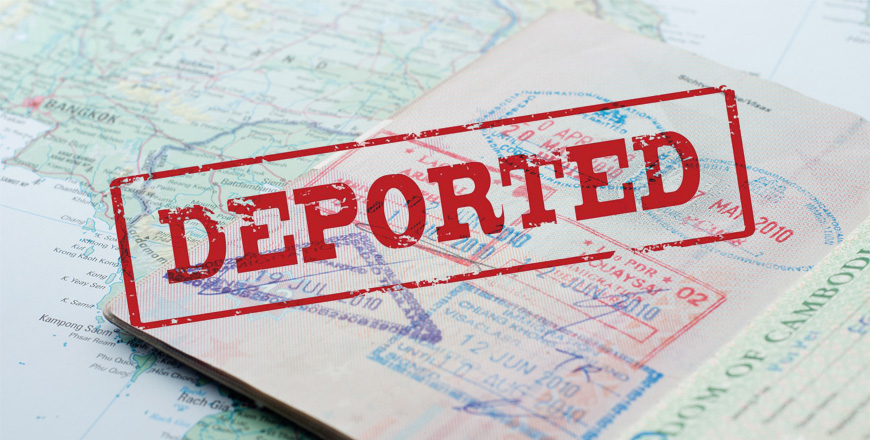Deportation Acquisition and Legal Objection
Process
Deportation is the process of removing a foreigner or refugee from the country in which he or she resides by a legal or administrative decision. This process is carried out within the framework of legal regulations implemented by countries to protect public order, national security and migration policies. The decision to deport is particularly relevant for irregular migrants, visa overstayers, foreigners who have committed crimes or individuals who pose a threat to public order.
However, deportation is not arbitrary and must be carried out within the framework of international law and fundamental human rights. Therefore, individuals facing deportation have legal rights and can take legal remedies against this decision within the scope of the appeal process granted to them. In this article, the deportation process, the ways of appeal and the legal mechanisms that can be applied against the deportation decision will be discussed in detail.
Deportation Process
Legal Bases of the Deportation Order
The decision to deport is based on domestic legal regulations and international conventions. In Turkey, deportation procedures are regulated under the Law No. 6458 on Foreigners and International Protection (LFIP ). According to the relevant articles of this law, a deportation decision may be taken against a foreigner in the following cases
- Those who violate their visa or residency period,
- Those who pose a threat to public order and security,
- People working as illegal workers or without a legal work permit,
- Those involved in human smuggling or human trafficking offenses,
- Those who use forged documents or are banned from entry,
- Those linked to terrorist organizations or involved in radical activities.
The deportation process is usually carried out by the Directorate General of Migration Management. The deportation decision is communicated to the foreigner in writing and the foreigner has the right to appeal.
Implementation of the Deportation Order
A deportation order can be implemented in different ways:
Voluntary Return: In some cases, a person scheduled for deportation may voluntarily agree to return to their country. Within the scope of voluntary return programs, support can be provided by international organizations and non-governmental organizations.
Forced Deportation: If the person does not appeal the deportation decision or if the appeal is rejected, the forced deportation process is initiated. In this process, the person may be held in removal centers and then sent to the relevant country.
Deportation with Travel Ban: In some cases, deportees may be banned from entering the country for a certain period of time. This ban may vary depending on the person’s criminal history and the reason for deportation.
Appeal Process against Deportation Decision
Right of Objection and Legal Bases
People facing deportation have legal rights. In Turkey, administrative and judicial appeals against deportation orders are open. According to Article 53 of Law No. 6458 on Foreigners and International Protection, the deportation decision can be appealed to the Administrative Court within 7 days.
It is very important to get “legal assistance ” during the appeal process. The person facing deportation has the right to a lawyer and with legal assistance, the decision can be canceled or postponed. While the judicial process is ongoing, the deportation process is suspended and the person can continue to stay in Turkey.
Stages of the Appeal Process
Administrative Appeal: The person may apply to the Directorate General of Migration Management for the annulment of the deportation decision. As a result of this application, the deportation decision will be re-evaluated and may be canceled if deemed necessary.
Application to the Court If the administrative appeal is unsuccessful or if the person wishes to appeal directly to the court, they can file a lawsuit with the Administrative Court. Once a lawsuit is filed, the court will examine whether the deportation decision is in accordance with the law and issue a decision. In the court process, factors such as the legal status of the person, the grounds for deportation and whether there has been a violation of human rights are taken into account.
Regional Administrative Court and Constitutional Court Process: If the court decision is in favor of deportation, the person can file an individual application to the Regional Administrative Court and finally to the Constitutional Court. In applications to the Constitutional Court, issues such as human rights violations and refugee status come to the fore.
International Legal Mechanisms against Deportation
Application to the European Court of Human Rights (ECHR)
If a person claims that they will be persecuted, tortured or their human rights will be violated if they are deported, they can apply to the European Court of Human Rights (ECHR). As Turkey is a party to the European Convention on Human Rights, it must abide by the decisions of this court.
The ECtHR evaluates applications under the “principle of non-refoulement “. If the court decides that deportation would violate the person’s right to life, Turkey is obliged to halt the deportation.
Application to the United Nations Commission on Human Rights
The deportation decision can be appealed to international organizations such as the United Nations Human Rights Committee and the Office of the High Commissioner for Refugees (UNHCR ). Especially for refugees, the decisions of these organizations are important and can stop deportation proceedings.
Deportation is a serious legal procedure that affects the right of migrants and foreigners to remain in the country. However, this process must be conducted in a lawful and fair manner. It is important that those who have been ordered deported are aware of their legal rights and initiate appeals in a timely manner.
The appeal process can be more effective with legal support and the deportation decision can be annulled. Particularly when international legal mechanisms are involved, deportation decisions are evaluated in detail to determine whether they violate human rights.
Therefore, people under threat of deportation should protect their rights by seeking legal assistance and making timely applications.




